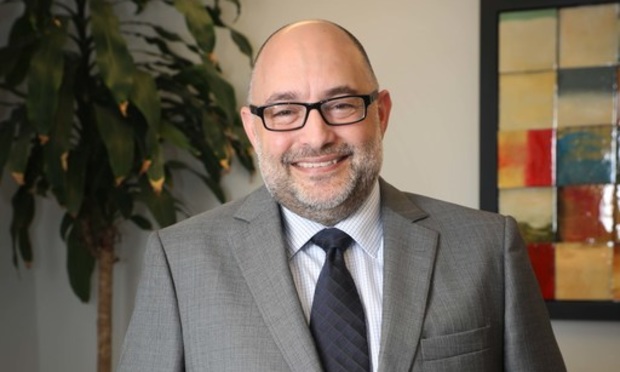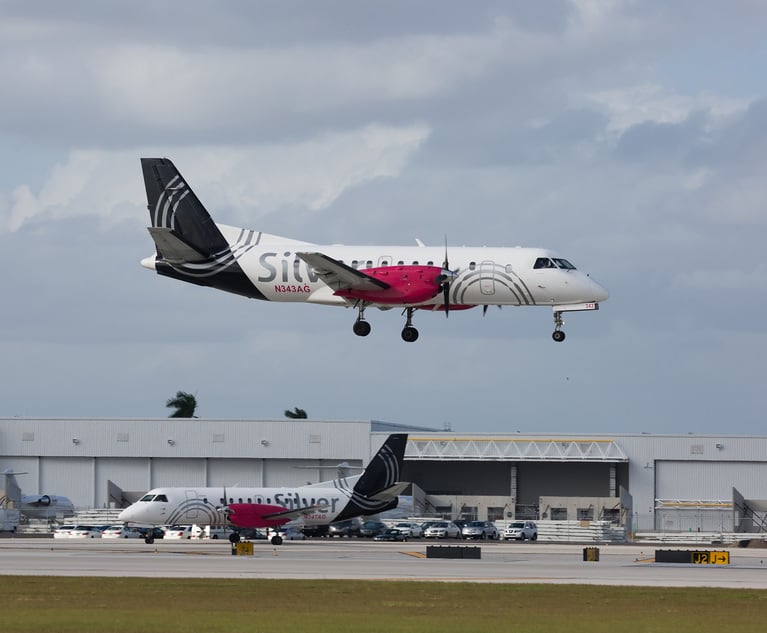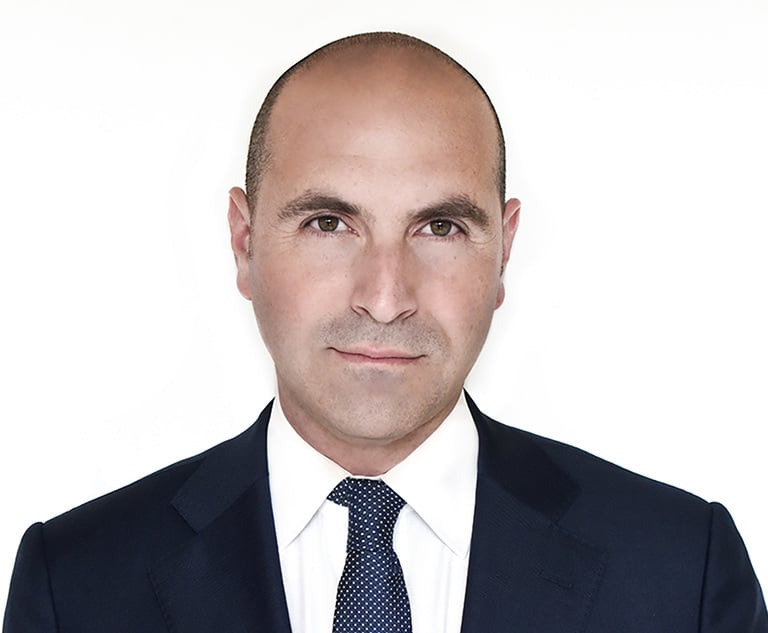Seafaring Adventures Leave Mark on Attorney Ross Hartog
After the pirates held him at gunpoint and after a shipwreck, Ross Hartog went back to the desert to study law.It was there in Arizona, oddly enough,…
November 03, 2017 at 11:20 AM
11 minute read

After the pirates held him at gunpoint and after a shipwreck, Ross Hartog went back to the desert to study law.
It was there in Arizona, oddly enough, that his parents had learned to sail. But there had been no inkling then or at sea that Hartog would wind up as a name partner practicing bankruptcy law at a respected South Florida firm. Or even, for that matter, in the law.
But those seafaring adventures in his early years left an indelible mark.
“It shaped me and made me willing to take risks and do things that sound good and make sense in my life,” he said. “Any opportunities I get I jump at. And I credit my parents and my experiences for that.”
His family lived near the ocean in Long Beach, California, when he was born and moved to Scottsdale, Arizona, when Hartog was a toddler. They bought a small boat and took up sailing on a lake outside the city.
The bug bit.
They moved back to California when Hartog was 9 and became true sailors, he said, living aboard a 44-foot sloop and taking two- and three-week sailing trips in the Pacific waters to build their maritime skills.
A year later, the family decided on a grand adventure. They would sail away, make their home on the sea and travel wherever the wind and the water would take them for as long as they wished.
“I thought it was great. I was excited. I thought it was really neat. I didn't have to go to school, which was good,” Hartog said. “I spent fifth and sixth grades living on board.”
Hartog and his parents sailed south from California along the coast of Mexico, then east through the Panama Canal and into the Caribbean.
That's where they met the pirates.
“This Zodiac came at us pretty quickly, pulled alongside,” he said. There were three men in it. “They had spear guns and fishing poles, but they also had machine guns with them. … They started yelling at us in Spanish and jumped aboard. And they took control.”
One stayed aboard the sailboat with Hartog and his mother as the others took his father ashore.
Time passed. Finally, the pirates returned with Hartog's father. They wanted food and gas. The family handed over canned goods and boxes until the pirates' boat could hold no more. The men told the family to wait as they ferried the foodstuffs ashore; they'd be back for more.
Hartog's father had other plans. The family made a run for it.
“Which is kind of funny because a sailboat goes, what, 8 miles an hour?” Hartog said. “We weren't really going to speed out of there.”
They watched as the heavily loaded boat sputtered toward the beach. As the men unloaded, the family pulled up anchor and started their getaway.
A few moments later, the pirates realized what was happening.
“As soon as they did, they turned the Zodiac back around, pushed it back out into the surf, and then couldn't get the engine started,” Hartog recalled. “We kept seeing them pulling on the outboard, trying to get it started.”
It never did.
The family sailed on through the Caribbean and then north, skirting the East Coast, until they reached the coast of Maine. Caught in a thick fog, the boat slammed into rocks and stuck fast.
The waves and the rocks did the rest, pounding the boat beyond repair. The family swam to a small island, and the Coast Guard brought them ashore. Their sailing adventure was over.
BANKRUPTCY BUDDY
A few months later, the family moved west again. Hartog went back to school and set his sights on college. Along the way, he developed an interest in the law.
“I didn't have an idea necessarily of what kind of law I wanted to practice,” he said. “But I knew I wanted to be in the law in some fashion.”
After he got his law degree, he landed a job at a products liability firm representing tire companies.
Three years later, “a buddy of mine from law school wanted to start his own firm and I said, 'What the heck?' ” Hartog said. “He had just finished a bankruptcy clerkship, so we decided we'd be bankruptcy lawyers. I didn't know anything about bankruptcy other than how to spell it.”
A year later, Hartog's wife got a job offer in Miami. Hartog came with her, with no job of his own. He passed the Florida bar exam in 2000 and stuck with bankruptcy law.
He worked as an associate doing creditors' rights cases at a firm for a couple of years, then joined Markowitz Davis Ringel & Trusty. By 2010, he became a shareholder, and his name replaced Miami-Dade County Judge Joe Davis' in its title.
He focuses his practice on reorganizations and restructuring, insolvency and receiverships, and splits his time between bankruptcy and fiduciary work.
“I don't even have a boat.”
Carlos Harrison is a freelance writer in Miami.
ROSS HARTOG
Born: 1970, Burbank, California
Spouse: Michelle
Children: Reid
Education: University of Arizona, J.D., 1995, B.S., 1992
Experience: Shareholder, Markowitz Ringel Trusty & Hartog, 2002-present; Associate, Haley Sinagra & Perez, 2000-2002; Partner, Denker & Hartog, 1998-1999; Associate, Michael McAllister, 1995-1998

After the pirates held him at gunpoint and after a shipwreck, Ross Hartog went back to the desert to study law.
It was there in Arizona, oddly enough, that his parents had learned to sail. But there had been no inkling then or at sea that Hartog would wind up as a name partner practicing bankruptcy law at a respected South Florida firm. Or even, for that matter, in the law.
But those seafaring adventures in his early years left an indelible mark.
“It shaped me and made me willing to take risks and do things that sound good and make sense in my life,” he said. “Any opportunities I get I jump at. And I credit my parents and my experiences for that.”
His family lived near the ocean in Long Beach, California, when he was born and moved to Scottsdale, Arizona, when Hartog was a toddler. They bought a small boat and took up sailing on a lake outside the city.
The bug bit.
They moved back to California when Hartog was 9 and became true sailors, he said, living aboard a 44-foot sloop and taking two- and three-week sailing trips in the Pacific waters to build their maritime skills.
A year later, the family decided on a grand adventure. They would sail away, make their home on the sea and travel wherever the wind and the water would take them for as long as they wished.
“I thought it was great. I was excited. I thought it was really neat. I didn't have to go to school, which was good,” Hartog said. “I spent fifth and sixth grades living on board.”
Hartog and his parents sailed south from California along the coast of Mexico, then east through the Panama Canal and into the Caribbean.
That's where they met the pirates.
“This Zodiac came at us pretty quickly, pulled alongside,” he said. There were three men in it. “They had spear guns and fishing poles, but they also had machine guns with them. … They started yelling at us in Spanish and jumped aboard. And they took control.”
One stayed aboard the sailboat with Hartog and his mother as the others took his father ashore.
Time passed. Finally, the pirates returned with Hartog's father. They wanted food and gas. The family handed over canned goods and boxes until the pirates' boat could hold no more. The men told the family to wait as they ferried the foodstuffs ashore; they'd be back for more.
Hartog's father had other plans. The family made a run for it.
“Which is kind of funny because a sailboat goes, what, 8 miles an hour?” Hartog said. “We weren't really going to speed out of there.”
They watched as the heavily loaded boat sputtered toward the beach. As the men unloaded, the family pulled up anchor and started their getaway.
A few moments later, the pirates realized what was happening.
“As soon as they did, they turned the Zodiac back around, pushed it back out into the surf, and then couldn't get the engine started,” Hartog recalled. “We kept seeing them pulling on the outboard, trying to get it started.”
It never did.
The family sailed on through the Caribbean and then north, skirting the East Coast, until they reached the coast of Maine. Caught in a thick fog, the boat slammed into rocks and stuck fast.
The waves and the rocks did the rest, pounding the boat beyond repair. The family swam to a small island, and the Coast Guard brought them ashore. Their sailing adventure was over.
BANKRUPTCY BUDDY
A few months later, the family moved west again. Hartog went back to school and set his sights on college. Along the way, he developed an interest in the law.
“I didn't have an idea necessarily of what kind of law I wanted to practice,” he said. “But I knew I wanted to be in the law in some fashion.”
After he got his law degree, he landed a job at a products liability firm representing tire companies.
Three years later, “a buddy of mine from law school wanted to start his own firm and I said, 'What the heck?' ” Hartog said. “He had just finished a bankruptcy clerkship, so we decided we'd be bankruptcy lawyers. I didn't know anything about bankruptcy other than how to spell it.”
A year later, Hartog's wife got a job offer in Miami. Hartog came with her, with no job of his own. He passed the Florida bar exam in 2000 and stuck with bankruptcy law.
He worked as an associate doing creditors' rights cases at a firm for a couple of years, then joined Markowitz Davis Ringel & Trusty. By 2010, he became a shareholder, and his name replaced Miami-Dade County Judge Joe Davis' in its title.
He focuses his practice on reorganizations and restructuring, insolvency and receiverships, and splits his time between bankruptcy and fiduciary work.
“I don't even have a boat.”
Carlos Harrison is a freelance writer in Miami.
ROSS HARTOG
Born: 1970, Burbank, California
Spouse: Michelle
Children: Reid
Education: University of Arizona, J.D., 1995, B.S., 1992
Experience: Shareholder,
This content has been archived. It is available through our partners, LexisNexis® and Bloomberg Law.
To view this content, please continue to their sites.
Not a Lexis Subscriber?
Subscribe Now
Not a Bloomberg Law Subscriber?
Subscribe Now
NOT FOR REPRINT
© 2025 ALM Global, LLC, All Rights Reserved. Request academic re-use from www.copyright.com. All other uses, submit a request to [email protected]. For more information visit Asset & Logo Licensing.
You Might Like
View All
Financially Grounded: South Florida-Based Silver Airways Files for Bankruptcy


US Judge Throws Out Sale of Infowars to The Onion. But That's Not the End of the Road for Sandy Hook Families
4 minute read
Growing Referral Network, Alternative Fees Have This Ex-Big Law’s Atty’s Bankruptcy Practice Soaring
5 minute readTrending Stories
- 1How Some Elite Law Firms Are Growing Equity Partner Ranks Faster Than Others
- 2Fried Frank Partner Leaves for Paul Hastings to Start Tech Transactions Practice
- 3Stradley Ronon Welcomes Insurance Team From Mintz
- 4Weil Adds Acting Director of SEC Enforcement, Continuing Government Hiring Streak
- 5Monday Newspaper
Who Got The Work
J. Brugh Lower of Gibbons has entered an appearance for industrial equipment supplier Devco Corporation in a pending trademark infringement lawsuit. The suit, accusing the defendant of selling knock-off Graco products, was filed Dec. 18 in New Jersey District Court by Rivkin Radler on behalf of Graco Inc. and Graco Minnesota. The case, assigned to U.S. District Judge Zahid N. Quraishi, is 3:24-cv-11294, Graco Inc. et al v. Devco Corporation.
Who Got The Work
Rebecca Maller-Stein and Kent A. Yalowitz of Arnold & Porter Kaye Scholer have entered their appearances for Hanaco Venture Capital and its executives, Lior Prosor and David Frankel, in a pending securities lawsuit. The action, filed on Dec. 24 in New York Southern District Court by Zell, Aron & Co. on behalf of Goldeneye Advisors, accuses the defendants of negligently and fraudulently managing the plaintiff's $1 million investment. The case, assigned to U.S. District Judge Vernon S. Broderick, is 1:24-cv-09918, Goldeneye Advisors, LLC v. Hanaco Venture Capital, Ltd. et al.
Who Got The Work
Attorneys from A&O Shearman has stepped in as defense counsel for Toronto-Dominion Bank and other defendants in a pending securities class action. The suit, filed Dec. 11 in New York Southern District Court by Bleichmar Fonti & Auld, accuses the defendants of concealing the bank's 'pervasive' deficiencies in regards to its compliance with the Bank Secrecy Act and the quality of its anti-money laundering controls. The case, assigned to U.S. District Judge Arun Subramanian, is 1:24-cv-09445, Gonzalez v. The Toronto-Dominion Bank et al.
Who Got The Work
Crown Castle International, a Pennsylvania company providing shared communications infrastructure, has turned to Luke D. Wolf of Gordon Rees Scully Mansukhani to fend off a pending breach-of-contract lawsuit. The court action, filed Nov. 25 in Michigan Eastern District Court by Hooper Hathaway PC on behalf of The Town Residences LLC, accuses Crown Castle of failing to transfer approximately $30,000 in utility payments from T-Mobile in breach of a roof-top lease and assignment agreement. The case, assigned to U.S. District Judge Susan K. Declercq, is 2:24-cv-13131, The Town Residences LLC v. T-Mobile US, Inc. et al.
Who Got The Work
Wilfred P. Coronato and Daniel M. Schwartz of McCarter & English have stepped in as defense counsel to Electrolux Home Products Inc. in a pending product liability lawsuit. The court action, filed Nov. 26 in New York Eastern District Court by Poulos Lopiccolo PC and Nagel Rice LLP on behalf of David Stern, alleges that the defendant's refrigerators’ drawers and shelving repeatedly break and fall apart within months after purchase. The case, assigned to U.S. District Judge Joan M. Azrack, is 2:24-cv-08204, Stern v. Electrolux Home Products, Inc.
Featured Firms
Law Offices of Gary Martin Hays & Associates, P.C.
(470) 294-1674
Law Offices of Mark E. Salomone
(857) 444-6468
Smith & Hassler
(713) 739-1250






